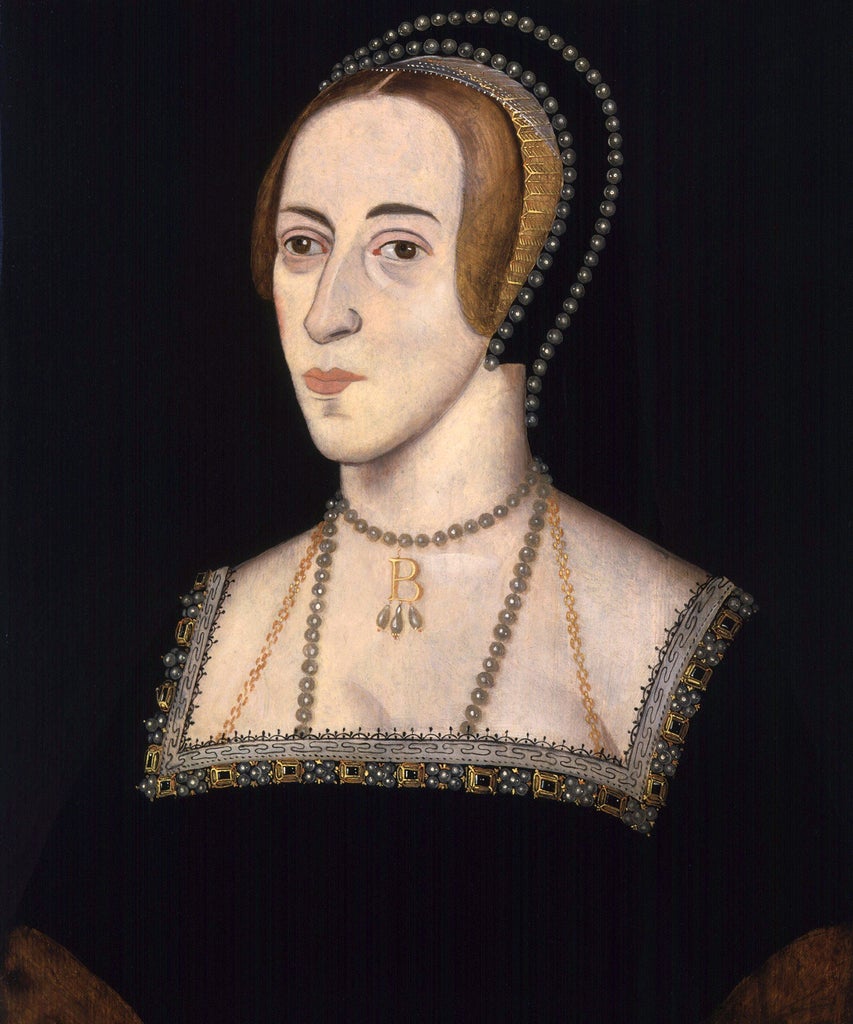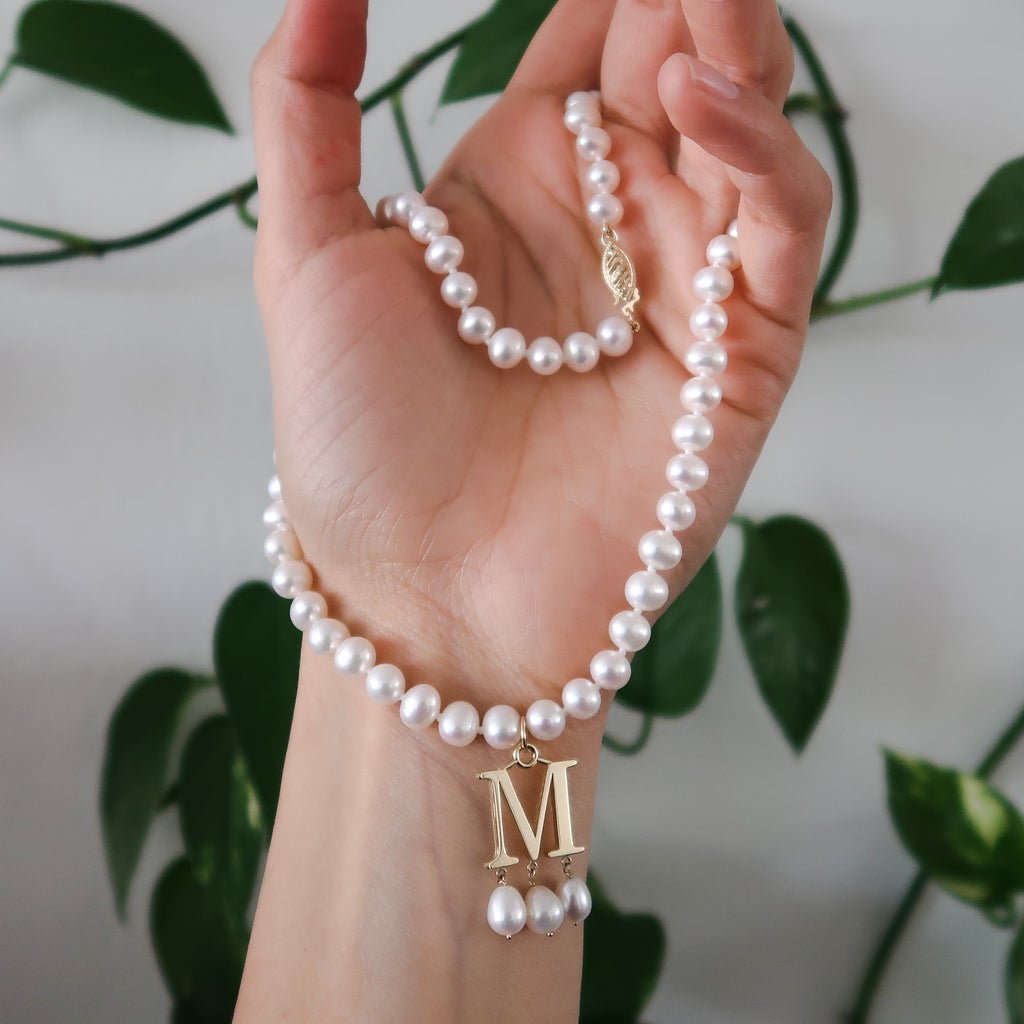
Last month, supermodel Bella Hadid wore an initial necklace with an oversized “B” charm from which three teardrop pearls dangled, which compelled a fleet of people to jump onto Google to try and figure out where the original came from. The answer? Hadid’s necklace was a replica of Anne Boleyn’s infamous lavaliere, immortalized in contemporary portraits of her from the late 16th century, which generated as much buzz in King Henry VIII’s court as it did on the internet 450 years later.
We’re witnessing the birth of Tudorcore, a trend that melds the it-pieces of 16th century England with today’s styles. After Hadid wore the necklace, demand for similar jewelry pieces jumped by 56%, according to global search platform Lyst. Meanwhile, over the past few months, the site has seen an increased interest in “Tudor” dresses. Heavily influenced by key members of the English royal court, Tudor style is distinguished for its square neckline and structured bodices, as well as the Spanish farthingale, a conical undergarment that gave volume to skirts.
The current trend is largely thanks to the BBC’s popular series The Boleyns: A Scandalous Family, which tells the story of the clan’s social rise from rich commoners to the higher echelons of British royalty, with their eldest daughter Anne becoming the detonator of political change in the country. The second wife of Henry VIII, king of England between 1509 and 1547, Anne Boleyn became queen in 1533. The same year, she gave birth to one of England’s most powerful monarchs, Elizabeth I. Later, in 1536, she was framed for treason, adultery, and incest before being beheaded. While most of Henry VIII’s wives after Boleyn suffered the same fate, her story is by far the most popular. For a time, Boleyn even adopted the motto, “Let them grumble, that is how it is going to be,” which Claire Ridgway, founder of The Anne Boleyn Files, says is the original “haters gonna hate.”
“I think the drama of her story grabs us,” Ridgway says. “She was a modern woman.”

So much so that her fashion choices seem more 2021 than 1531. Today, initial necklaces are having a moment. Luxury designers like Balenciaga and Chloé have released their iterations of initial necklaces, which vary from oversized chain-link silhouettes to dainty gold charm pieces. Nameplate necklaces — which literally have a person’s name on them — have also been a longtime modern tradition. In general, monogrammed pieces are most often associated with the rich and famous, and back in the 16th century, the story was the same. According to Ridgway, initials were seen on royal accessories back then, with Boleyn also sporting an “H-A” necklace in official portraits in honor of her marriage to Henry VIII, a trend reserved for those with economic means to commission such pieces. Historians have long attempted to read meaning into Boleyn’s initial necklaces, mainly because the portraits available were created half a century after her beheading. And as Boleyn’s story keeps getting depicted in movies and shows like The Other Boleyn Girl and The Tudors, the attention to Boleyn’s jewelry just continues to grow. After all, there is a twisted poetry in Boleyn’s most famous fashion statement being an accessory she wore around the very neck that was famously severed.
Adriana, 21, who preferred to keep her last name private, first learned about the necklace from Hadid’s outing, and shared her first reaction on Twitter: “God this is so sexy. Definitely worth getting my head lopped off.” For her, the appeal comes from the necklace’s design. “I am quite surprised to know that it was modeled after Anne Boleyn’s necklace because of the modern, almost timeless design,” she says. “I think that the necklace can stand up by itself.”
According to Ridgway, Anne Boleyn’s sex appeal has been mythologized for centuries because people are genuinely puzzled by Henry VIII’s seemingly risky obsession with Boleyn. To marry her, he renounced his Catholic faith, the entire foundation upon which English royalty claimed power, to get an annulment from his first wife, Catherine of Aragon. His relationship with Anne Boleyn began a religious crisis in England, and marked the beginning of the Anglican Church. For Ireland-based Roisin Byrne, who learned about Anne Boleyn from the musical Six, her story is part of a larger cultural phenomenon that is reevaluating the way women were vilified in history.
“Anne Boleyn feels like the blueprint for victimized women who were characterized as promiscuous or manipulative,” she says, adding that the way Anne Boleyn was sexualized and demonized was the precursor to how society exploited contemporary women like Britney Spears.
Yet, as much as we know about Anne Boleyn’s life, the history of the “B” necklace is a little murky. According to Ridgway, it’s unclear where the necklace first originated or whether it was passed down to Elizabeth I once Boleyn died. Some say the necklace is now part of the Imperial State Crown, currently worn by Queen Elizabeth II, but Ridgway says that’s unfounded.
But the mystery — as well as the gruesome story of its wearer — is part of the necklace’s appeal. Just look on Etsy, Amazon, or Depop and you’ll find plenty of versions from sellers who are either offering exact replicas or creating personalized iterations of the famous necklace. Even the official shop of the Tower of London, where Henry VIII held his court, sells replicas of the necklace, retailing for $75.

One of these Anne Boleyn Etsy sellers is Maydi Díaz. Her approach is to modernize the former queen’s necklace with interchangeable initials so people can customize it to their own names. Díaz says she’s always been intrigued by historical fashion, specifically Tudor-style clothing and jewelry, but Boleyn’s necklace stands out because of the story: “I think we can identify with Anne’s uninhibited way of living, with her tendencies of doing whatever it takes in the hope of happiness.”
New York-based Boleyn cosplayer Julia, who preferred to keep her last name private, has been dressing up as Boleyn since 2020. After watching the musical Six, she became obsessed with Boleyn’s story and fashion, flocking to Amazon, Etsy, and eBay for Tudor-style dresses, headpieces, and jewelry that resemble the portraits we now know of the former queen. Her Instagram account showcases just how much Julia identifies with Boleyn’s story, staging photoshoots with the costumes she procures online in order to bring a bit of Boleyn back to life, nearly 500 years after her death.
Of course, in most of her pictures, she wears a replica of Boleyn’s pearl necklace. “Her bravery and strength in a male-dominated time inspires me so much,” she says.
Like what you see? How about some more R29 goodness, right here?
What "Bridgerton" Gets Spot On About 1800s London
Meet The Designer Turning Tea Towels Into Corsets
What Is Wearing A Corset Really Like?
DMTBeautySpot
via https://dmtbeautyspot.com
Frances Solá-Santiago, DMT.NEWS, DMT BeautySpot,


0 comments